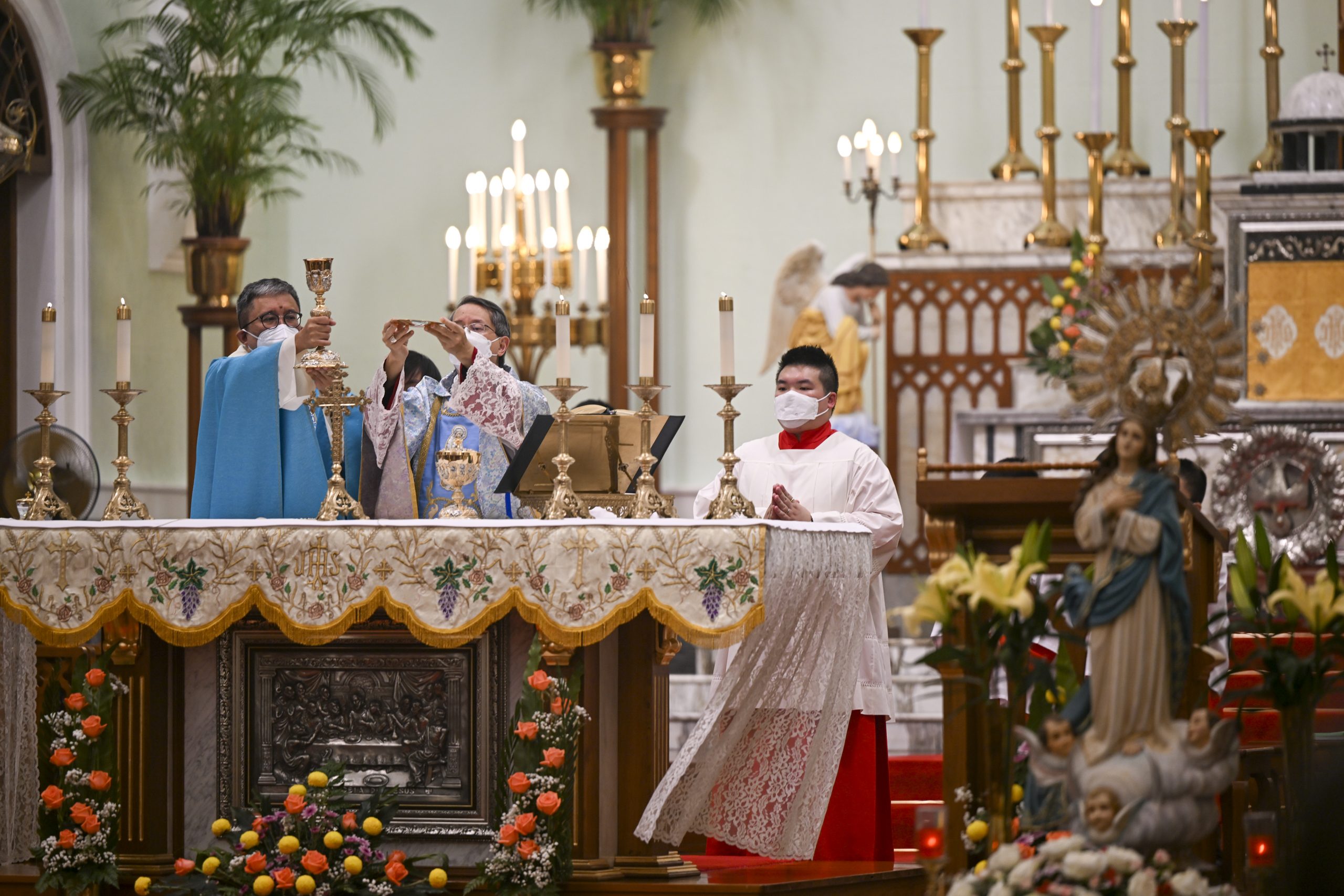FAUSTO GOMEZ OP
“Master, where do you live?”– He lives also in the Holy Eucharist: in the Eucharistic Bread and Wine. Jesus proclaims to us: “Very truly, I tell you, unless you eat the flesh of the Son of Man and drink his blood, you have no life in you” (Jn 6:53).
The Eucharist has always been essentially important in the life of a Christian. The Eucharist is “the fount and apex of the whole Christian life” (Vatican II, LG 11). “The other sacraments, as well as every ministry of the Church and every work of the apostolate, are linked with the Holy Eucharist and are directed towards it” (Vatican II, OT 5). “The Eucharist is the greatest gift of the Sacred Heart of Jesus” (St. Paul VI). It is “the most precious gift that the Church can have in her pilgrimage through history” (St. John Paul II). In the sacrament of the Eucharist, “Jesus continues to love us ‘to the end,’ even to offering us his body and his blood” (Benedict XVI).
In the Holy Eucharist, we celebrate the paschal mystery, the death and resurrection of Christ. “This is the mystery (the sacrament) of faith,” the priest proclaims after the consecration of the bread and wine. It is an encounter with the Risen Lord, with Jesus who lives.
The Eucharist is a communion of love. A communion with the Lord implies communion with brothers and sisters, for we all partake of one bread: “We, though many, are one body, for we all partake of the one loaf” (1 Cor 10:16-17). The Eucharist is also called the Sacrament of Charity(St. Thomas): to love God, to love all neighbors, especially the poor and downtrodden. The Eucharist is also, as Benedict XVI underlines, the Sacrament of Peace.
As a communion of peaceful, merciful and joyful love (charity), the Holy Eucharist is a call to unity (cf. 1 Cor 10:16-17): “one Bread that helps us behave as one Body, as one People.” The Eucharistic celebration brings Christians together as communities of disciples and members of Christ’s Church. Moreover, the Eucharist is a call to mission:to witness Jesus’ incredible love by sharing our life in the service of others, by breaking our breadwith those who have no bread.
The Eucharist has an eschatological dimension: “Anyone who eats this bread will live forever” (Jn 6:51). It does not introduce us immediately into heaven, but, as St. Thomas says, it gives us the power to reach there. The Eucharist revives our hope in heaven.
From the evangelical accounts and St. Paul (1 Cor 11:23-26), four things come out very clearly. First, the Eucharist is Real Presenceof Christ: He gives His Body to eat, and His Blood to drink. Second, the Eucharist is the Sacrament: grace and love are given to man. Third, the Eucharist is the Sacrifice. And fourth, the Eucharist is the living memorial of Christ’s passion, death and resurrection.
_____________WITHOUT THE EUCHARIST, WE CANNOT LIVE_______
(1) The Eucharist is Real Presence – The feast of Corpus Christi was instituted by Pope Urban IV, who requested St. Thomas Aquinas to write the whole Divine Office and texts for the Mass of this new feast, in the year 1264. The objective of the new feast was: To proclaim faith in the Real Presence of Christ in the Eucharist, in the Blessed Sacrament.
From this Real Presence stems the devotion to the Blessed Sacrament. We adore Him – adoro te devote – in the Blessed Sacrament. We visit Him present in so many churches and chapels. St. Manuel González, bishop (1877-1940), canonized in 2016 by Pope Francis, was a great devotee of the Eucharist, and became to be known as the Bishop of the Tabernacle (el Obispo del Sagrario). He spread the devotion to the Eucharist and encouraged frequent reception of it. He advocated, by example, visits to Sagrarios abandonados (abandoned Tabernacles).
(2) The Eucharist is the Sacrament of Sacraments, “the greatest of all miracles,” Saint Thomas says. It is an act of worshipto honor God, and an act of reparationfor our sins, and an act of petition of divine grace and glory. It is, moreover, an act of thanksgiving (this is the meaning of “Eucharist”).
(3) The Eucharist is the Holy Sacrifice.It is a re-presentation, a re-actualization of the same, unique and unrepeatable sacrifice of the Cross: Christ died only once – on Calvary. And on the altar after consecration, we have the same supreme priest Jesus, and the same Host – Jesus, sacrificed now in an unbloody manner.
(4) The Eucharist is the living memorial (while it iscommemorated it is re-lived!) of the sacrifice of the cross: “Do this in memory of me,” Jesus said. The Eucharist primarily means “a broken body for broken people” (Francis Moloney).
Indeed, the Eucharist is the heart of the liturgy, of Christian worship. The first Christians understood this quite well; and thus, they did not need to be obliged to go to Mass. They were keenly aware of what we read in an important early document: “He who does not celebrate Sunday is diminishing the Church and depriving the Body of Christ of one member” (Didaschalia Apostolorum).
No wonder that Sunday was so essential in the life of the Christians of the first centuries! They all went to Mass – for “the breaking of the Bread”, even if it was forbidden to them by “pagan” governments. When Christians were caught celebrating the Mass underground by the civil authorities, they were sent to jail; at times, to martyrdom. The judge asked them: “Why do you celebrate underground your rituals on Sunday, when you know that, if caught, you will end up in jail?” The Christians answered as one: “We are Christians, and it is impossible for us to live without the Eucharist.” Amazing what the nonbelievers said of them: “Look how they love each other.”
“Without the Eucharist, we cannot live.” How then can we neglect the Eucharist, especially the Sunday Eucharist?


 Follow
Follow


